Currently, 36% of firms in the real estate sector globally report using AI, and this number is expected to soar to 90% by 2030. The time to invest in AI for reducing administrative tasks and enhancing decision-making is now –or you risk being left behind in this AI adoption race.
In this article, we’ll explore the key advantages of AI in the real estate sector and delve into 10 concrete examples of how AI real estate solutions are transforming the industry. By understanding these use cases, you’ll gain actionable insights on how to leverage AI to stay competitive and drive success in real estate business.
- What benefits does AI provide to real estate professionals?
- 10 real estate AI use cases transforming the industry
- 1. Property valuation forecasting
- 2. Real estate investment analysis
- 3. Commercial real estate location selection
- 4. Streamlining mortgage closings
- 5. Fraud detection
- 6. Listing description generation
- 7. NLP-powered property search
- 8. Lead generation and nurturing
- 9. Property management
- 10. Construction project management
- Conclusion
What benefits does AI provide to real estate professionals?
AI is revolutionizing the real estate sector in 2025, bringing transformative benefits that enhance efficiency, accuracy, and decision-making across the sector. By leveraging advanced data analytics, machine learning, and automation, AI tools are helping real estate professionals stay competitive and responsive in a rapidly evolving market. These technologies are not only improving specific tasks but also creating a more dynamic and transparent real estate development industry overall.
Key benefits include:
- Rapid data processing: Unlike traditional methods, AI can swiftly analyze vast amounts of data, such as market trends, historical sales, and property features, in seconds rather than hours.
- Geospatial and image analysis: Traditional location analysis and property assessment are labor-intensive and slow. AI’s ability to analyze geospatial data opens up new opportunities for advanced, visual, location-based analytics.
- Enhanced anomaly detection: AI excels at identifying irregular patterns and anomalies in data, such as potential fraud or risks, far more consistently and quickly than manual reviews.
- Improved client interactions: AI's Natural Language Processing (NLP) capabilities enable the use of new tools such as chatbots and virtual assistants that can provide instant, personalized service at scale.
10 real estate AI use cases transforming the industry
The integration of AI in real estate is not just about improving individual tasks; it is reshaping the entire industry by introducing innovative solutions to long-standing challenges in the sector. From property valuations to fraud detection, real estate artificial intelligence applications are providing unprecedented efficiency and accuracy, transforming how real estate professionals operate. Here are 10 real estate AI use cases that are revolutionizing the industry in 2025:
Property valuation forecasting
Property valuations rely on historical sales data, comparable market analysis, and the expertise of appraisers. However, this method can be time-consuming and prone to human error.
AI revolutionizes this process by leveraging machine learning algorithms that analyze vast amounts of data from sources such as recent sales transactions, economic indicators, property characteristics, and neighborhood trends. By continuously learning from new data, AI models provide highly accurate and up-to-date property valuations, enabling real estate companies to make more informed decisions about pricing, investment, and market positioning.
Impact:
- Real estate agents: AI-driven property valuation forecasting provides agents with accurate, real-time property values, helping them set competitive prices and offer better client advice.
- Investors: AI can help forecast future property values, enabling investors to make strategic decisions and identify lucrative opportunities while mitigating potential risks.
- Property valuers/appraisers: AI real estate solutions enhance the accuracy and efficiency of property valuations, reducing human error and offering reliable, data-driven assessments to every real estate agent.
- Home buyers and sellers: AI provides transparent and precise property valuations, ensuring fair pricing and streamlining the buying and selling process.
Example AI tools:
- House Canary: An AI-powered platform tailored for real estate professionals and property investors, providing extensive analytics and insights into property data to facilitate informed investment decisions.
- Hello Data.ai: Offers unit-level rent and historical concessions data, enabling users to make optimal pricing decisions.
- Plunk: AI tool that utilizes advanced analytics, machine learning, and image analysis to transform how homeowners, experts, and investors assess and invest in residential real estate.
- Reonomy: A real estate data and analytics platform leveraging AI to deliver market trends and property values to commercial real estate investors.
Case study:
Roofstock, a prominent data, analytics, and investment platform specializing in the single-family rental (SFR) sector, faced the challenge of accurately valuing properties and reviewing appraisals across diverse nationwide markets. To address this, Roofstock integrated HouseCanary's advanced AI-powered analytics into their operations, which provided the appraisal team with detailed neighborhood insights, surpassing the contextual understanding of many local experts.
Automated processes and real-time data analysis accelerated the appraisal and valuation process, allowing faster decision-making and enabling Roofstock to efficiently manage a larger volume of properties without compromising quality.
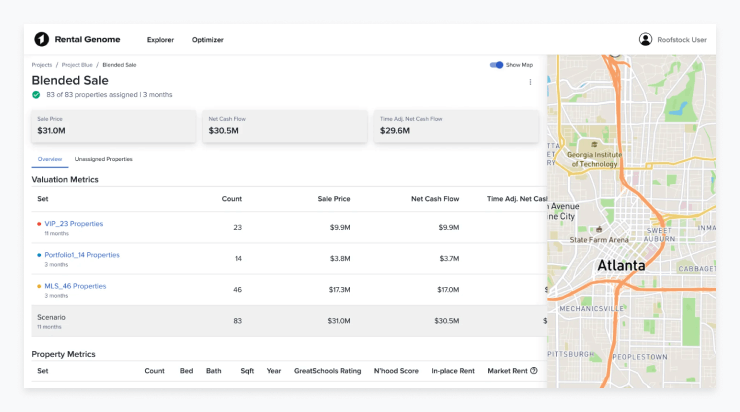
Real estate investment analysis
By leveraging vast amounts of data, AI algorithms can analyze market trends, property performance metrics, and economic indicators with unprecedented speed and accuracy. This advanced capability allows investors to predict future property values and investment returns with greater confidence.
This shift not only significantly reduces risks but also increases potential returns by providing a more comprehensive and nuanced understanding of the market. The scalability offered by AI transforms real estate investment analysis from a labor-intensive process to a highly efficient and data-driven strategy.
Impact:
- Investors: AI-driven investment analysis provides precise predictions and insights, allowing investors to make informed and strategic decisions, optimizing their investment portfolios.
- Financial institutions: AI enhances the accuracy of risk assessments and investment appraisals, helping financial institutions offer better-informed lending and investment products.
Example AI tools:
- Keyway: Utilizes AI-powered tools to uncover unique opportunities, boost productivity, and deliver detailed insights into deals, assets, and market conditions.
- Entera: A residential real estate investing platform that allows investors to discover, purchase, and manage single-family homes on a large scale.
- Skyline AI: Provides a platform for rapid and thorough analysis of commercial real estate properties, enhancing the speed and comprehensiveness of investment evaluations.
Case study:
Keyway, an investment management firm, leverages AI to enhance its acquisition sourcing process, particularly targeting the middle market where data is often scarce. According to CEO Matias Recchia, their platform ingests and analyzes deal data to identify promising acquisition opportunities. Currently, the platform utilizes analytical AI with predictive capabilities, providing detailed insights into potential investments.
Additionally, Keyway is licensing this advanced platform to third parties, including a pilot program with multifamily asset managers. As they continue to innovate, Keyway is also testing features with generative AI and their own language learning models to further refine their analytical processes.
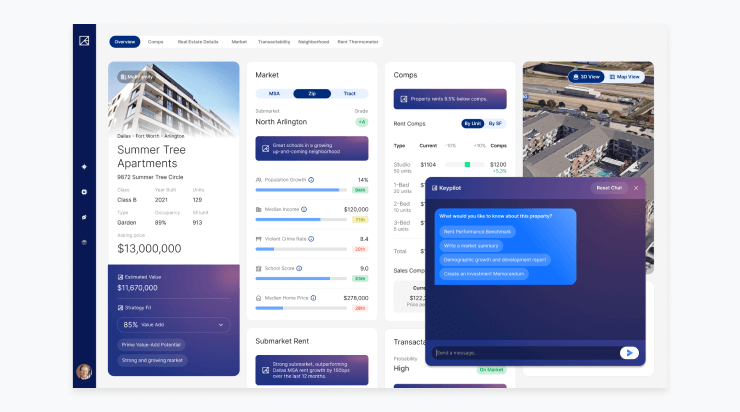
Commercial real estate location selection
AI in commercial real estate location selection transforms the process of identifying optimal sites for businesses. By analyzing a multitude of factors such as foot traffic patterns, demographic data, local economic conditions, and competitor locations, real estate AI tools can provide comprehensive insights into the most advantageous locations for commercial properties. This data-driven approach ensures that businesses choose sites that maximize their potential for success, enhancing both operational efficiency and profitability.
Impact:
- Business owners: AI helps business owners select prime locations by providing detailed analysis of customer demographics, foot traffic, and local market conditions, thereby boosting business performance.
- Commercial real estate agents: AI streamlines the location selection process for agents, allowing them to offer clients data-backed recommendations and improving the chances of successful lease agreements.
- Investors: AI tools can assist investors in identifying high-potential commercial properties, ensuring better investment returns and minimizing risks associated with poor location choices.
Example AI tools:
- Tango Analytics: A real estate AI tool enabling retailers, restaurants, and corporate enterprises to make data-driven decisions for their real estate and facilities strategies.
- Bestplace: A research and predictive geoanalytical tool offering end-to-end visibility of local shopper patterns.
- Placer.ai: A platform that analyzes visit trends, benchmarks performance, uncovers audience characteristics and behavior, and informs site selection decisions.
Case study:
Dunkin, a global leader in franchising quick service restaurants under the Dunkin’ Donuts and Baskin-Robbins banners, faced significant challenges with disparate systems managing their real estate processes. Previously, running a sales forecast took the company an hour.
After implementing Tango Analytics, this process now takes just 30 seconds, resulting in a 5,000-hour annual savings for Dunkin’. Utilizing Tango’s advanced models, Dunkin’ Brands has successfully opened over 1,000 new locations, showcasing the transformative impact of AI on efficient and strategic commercial real estate location selection.
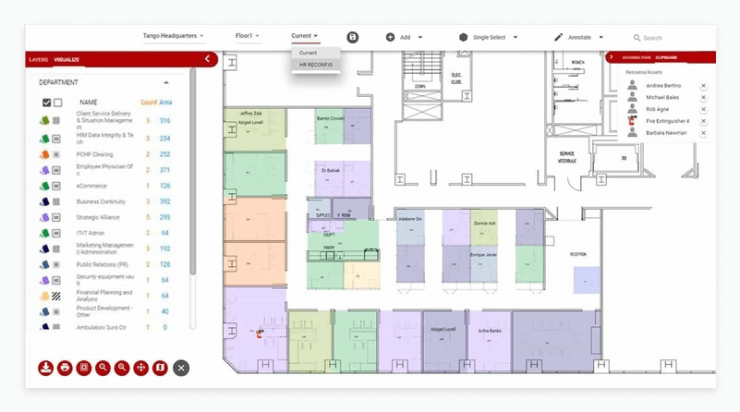
Streamlining mortgage closings
AI-powered tools can streamline the mortgage closing process by significantly enhancing efficiency and accuracy. By automating document review, verifying financial information, and ensuring compliance with regulatory requirements, AI reduces the time and effort required to finalize mortgage transactions. This results in faster closings, fewer errors, and a more seamless experience for all parties involved, ultimately leading to higher satisfaction rates among home buyers and sellers.
Impact:
- Home buyers: AI accelerates the mortgage closing process, reducing the waiting time and minimizing stress, allowing buyers to move into their new homes more quickly.
- Lenders: AI improves accuracy in document verification and compliance checks, reducing the risk of errors and ensuring that loans are processed more efficiently.
- Title companies: AI can automate many of the administrative tasks involved in mortgage closings, increasing operational efficiency and reducing the likelihood of delays or mistakes.
Example AI tools:
- Areal: A real estate AI tool offering industry-specific document understanding, data extraction, and workflow features, enabling businesses in the lending and title sectors to eliminate manual document processing.
- Silverwork Solutions: Provides role-based autonomous automation, seamlessly integrating a digital workforce into the loan manufacturing process, from application to post-closing.
- alanna.ai: An AI-powered virtual closing assistant designed specifically for title companies, streamlining their closing processes.
- Ocrolus: Utilizes AI-driven document automation to accelerate the mortgage journey, enhancing efficiency from application through loan processing, underwriting, and closing.
Case study:
FreshCuts has significantly enhanced its mortgage closing process by integrating Ocrolus, an infrastructure platform known for analyzing financial documents with over 99% accuracy. This integration allows FreshCuts to efficiently ingest and verify documents such as bank statements, IDs, and business formation records, streamlining the onboarding and Know Your Customer (KYC) verification processes.
Additionally, actionable data from invoices and purchase orders is now easily retrievable, automating back-office accounting tasks. With Ocrolus, FreshCuts has also established a robust foundation for offering loan products and merchant services, eliminating the need for manual underwriting and further expediting mortgage closings.
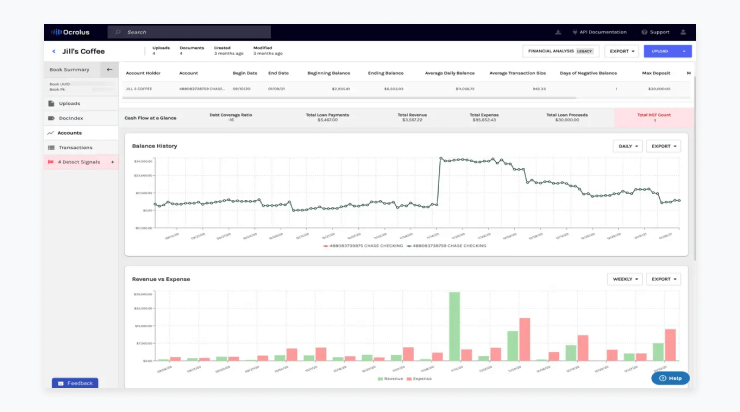
Fraud detection
Artificial intelligence technologies are now playing a crucial role in detecting and preventing financial fraud within the real estate industry. By implementing AI-powered transaction monitoring and identity verification systems, real estate professionals can swiftly identify suspicious activities. Specialized real estate AI tools can analyze transaction patterns, verify identities using biometric data, and assess risks associated with each transaction. This proactive approach not only reduces financial losses but also ensures the integrity of real estate transactions, providing a safer and more reliable environment for all parties involved.
Impact:
- Lenders: AI helps lenders detect and prevent fraudulent loan applications, reducing the risk of financial losses and maintaining the integrity of their lending operations.
- Home buyers: AI provides an additional layer of security for buyers in the residential real estate market, ensuring that their transactions are legitimate and reducing the likelihood of falling victim to fraud.
- Real estate agents: AI supports agents by identifying fraudulent activities early in the transaction process, safeguarding their reputation and ensuring smoother, more secure transactions for their clients.
Example AI tools:
- Proof: The world’s first identity-assured transaction management platform, combining automated identity verification solutions with humans to intervene when trust is at risk.
- Propy: Real estate transaction platform that uses blockchain technology and artificial intelligence to streamline real estate sales and make them more secure.
- Snappt: Tenant screening software designed to prevent applicant fraud in the property management industry. It focuses on reducing bad debt and evictions by accurately detecting fraudulent documents.
Case study:
Snappt’s market-leading fraud detection solution is built directly into ResidentIQ via TenantTech. This partnership helps property managers nationwide reduce evictions and bad debt. It also increases the confidence in screening decisions with the added benefit of document fraud detection, all within a singular software environment.
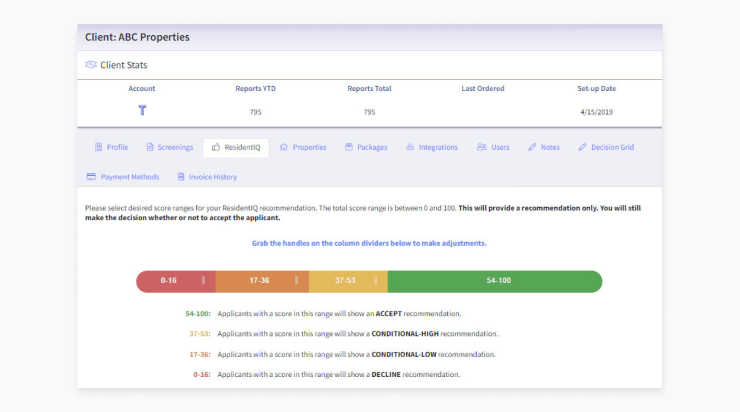
Listing description generation
One of the most time-consuming parts of listing a property for sale or rent is generating listing descriptions. Thanks to NLP, AI tools can now help real estate professionals create property listings quickly and accurately. These tools use AI to analyze property details and market trends. This ensures that each property is described effectively, saving time for agents and making listings more attractive to potential buyers and renters.
Impact:
- Real estate agents: AI tools automate listing creation, allowing agents to focus on client interactions and ensuring detailed, optimized listings.
- Home sellers: AI-generated descriptions highlight unique property features, increasing the chances of a quick and profitable sale.
- Property managers: AI tools streamline rental property listings, ensuring appealing and consistent descriptions that attract quality tenants.
- Buyers and renters: AI-enhanced listings provide accurate information, making it easier to find properties that meet their needs.
Example AI tools:
- Crexi’s AI Script: Harnesses natural language processing to auto-generate compelling property descriptions, saving brokers time and enhancing marketing materials.
- Listing AI: Real estate description generator that creates unique and high-quality property descriptions, social media content, and more.
- Restb.ai: AI tool that analyzes property images, identifying and categorizing various elements to provide actionable insights and automate manual processes such as writing listing descriptions.
Case Study:
Anticipa has drastically reduced the bottleneck in listing properties from days to seconds by utilizing Restb.ai's AI-generated property descriptions. Previously, Anticipa depended on expensive human contractors to research and write descriptions, resulting in inconsistent quality and prolonged listing times, which negatively impacted their bottom line.
With Restb.ai’s automated solution, the cost of generating property descriptions has significantly decreased, and descriptions are now created in mere seconds instead of an average of 7 days. Given that Anticipa sells thousands of homes annually and incurs an opportunity cost of €15 for each day a listing remains unlisted, the company anticipates saving over €1,000,000 per year with this new AI-driven approach.
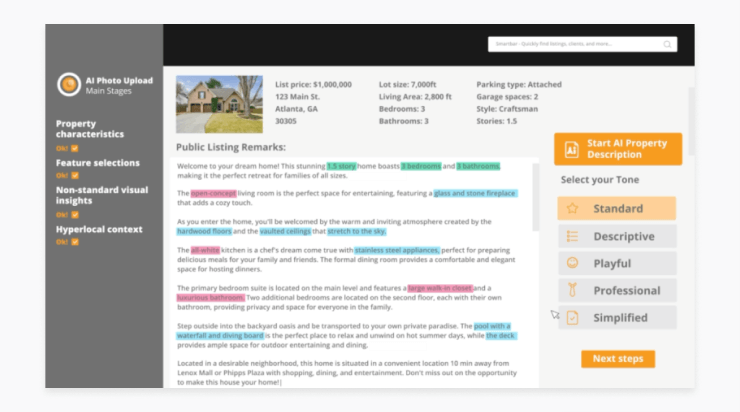
NLP-powered property search
Traditional property search methods often require hours of manual labor, sifting through countless listings to find properties that meet specific criteria. Natural Language Processing (NLP) has revolutionized this process by enabling users to search for properties using natural, conversational phrases rather than complex filters.
Home buyers or prospective tenants can enter phrases like "find a $700K home for sale in New Jersey with a backyard" or "rent a house near me with three bedrooms" directly into the search bar. The AI interprets these phrases, understands the user's intent, and delivers precise search results that match their specific needs, eliminating the need to manually select multiple filters such as state, city, house type, and number of bedrooms. As a result, property searches become more intuitive, efficient, and user-friendly, making the entire process more enjoyable for home buyers and prospective tenants.
Impact:
- Home buyers: AI tools provide personalized property recommendations based on detailed preferences, making it easier and faster for buyers to find homes that meet their specific needs.
- Real estate agents: By leveraging AI tools, agents can offer more tailored property suggestions to clients, enhancing their service quality and improving client satisfaction.
Example tools:
- Ask Redfin: AI-powered virtual assistant available in beta on the Redfin iPhone app. It helps house hunters quickly find information about for-sale homes.
- Zillow’s NLP search: Zillow’s natural language search feature allows buyers and renters to search for homes using conversational phrases.
- ListAssist: An AI-driven tool that can be integrated into an agent’s own website that enables users to describe their ideal home, delivering personalized search results.
Case study:
The Ashton Real Estate Group of RE/MAX Advantage in Middle Tennessee has transformed property search on their website by launching the ListAssist AI-powered search tool. Unlike traditional apps that require users to filter by square footage, number of rooms, or price, this cutting-edge technology allows users to simply type their wish list into Nashvillesmls.com. For instance, entering "brick home with a big front yard" yields instant results without the need for checking boxes or using multiple filters.
With ListAssist AI, the search process is streamlined and efficient, delivering results in seconds. This innovative approach eliminates the hassle of manual filtering, providing a seamless and intuitive property search experience for users.

Lead generation and nurturing
AI is revolutionizing lead generation and nurturing in the real estate industry by automating and optimizing how potential clients are identified, engaged, and converted. Traditional methods of lead generation often involve manual data entry, cold calling, and broad marketing campaigns, which can be time-consuming and inefficient. AI changes this by analyzing vast amounts of data from various sources, such as social media, website interactions, and historical client behavior, to identify high-potential leads accurately.
Within this category, AI-enhanced CRM systems further streamline this process by using machine learning to score leads based on their likelihood to convert. These systems prioritize leads for agents, ensuring they concentrate on high-value opportunities. Additionally, AI-driven CRM tools can automate follow-up emails, messages, and reminders, maintaining consistent communication with leads and preventing any from falling through the cracks.
Impact:
- Real estate agents: AI tools automate lead follow-up and personalized communication, freeing up agents to focus on closing deals and providing high-quality client service.
- Marketing teams: AI helps marketing teams identify the most promising leads and tailor their strategies, resulting in more effective campaigns and better ROI.
- Brokerages: AI-driven lead nurturing enhances the overall productivity of brokerage firms, ensuring that no potential client falls through the cracks and maximizing conversion rates.
Example AI tools:
- Cincpro: Automated real estate sales assistant that nurtures buyer and seller leads using intelligent scripts from real estate experts with the goal of moving leads towards agent readiness appointments.
- Wise Agent: All-in-one real estate CRM that helps agents automate lead management, responses, appointments, and transactions.
- Catalyze AI: Provides predictive analytics for real estate lead generation. It identifies high-propensity prospects using big data, AI, and event-driven data.
- Homebot: Loan officers and real estate agents use it to engage clients, track home value, and provide actionable information.
Case study:
Broker and co-owner at Heartland Real Estate Group in Buford, Georgia leveraged Wise Agent to improve their marketing and conversion strategy. Wise Agent has allowed him to build meaningful relationships that create conversations, conversations that turn into opportunities, and opportunities that turn into transactions.
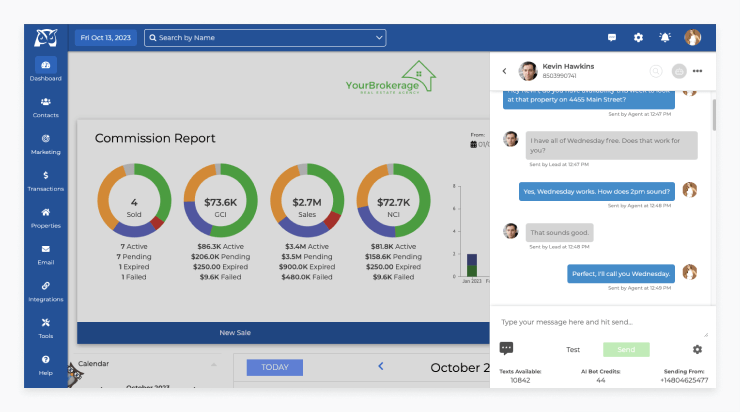
Property management
Property management AI software is revolutionizing the real estate sector by automating and optimizing various aspects of property management. These AI-driven tools can handle tasks such as tenant communication, maintenance scheduling, rent collection, and even predictive maintenance. By analyzing data and learning from patterns, AI software can anticipate issues before they become major problems, enhance tenant satisfaction through timely responses, and streamline operational processes. This leads to significant cost savings, improved efficiency, and better tenant retention, making property management more effective and less labor-intensive.
Impact:
- Property managers: AI software automates routine tasks and maintenance scheduling, allowing managers to focus on strategic planning and improving tenant relations, leading to increased efficiency and tenant satisfaction.
- Landlords: Enhanced rent collection processes and predictive maintenance reduce operational costs and ensure properties are well-maintained, leading to higher profitability and property value.
- Tenants: AI-driven property management tools provide timely responses to maintenance requests and improved communication, resulting in a better living experience and higher satisfaction.
Example AI tools:
- HappyCo: JoyAI automates the most time-consuming tasks from scheduling and assigning work orders, pre-filling in the details on service requests, to simplifying inventory management and improving asset lifespan.
- EliseAI: Elise manages communication across multiple channels and automatically answers questions within minutes — even after hours.
- STAN AI: Answers questions from residents in a rental community about maintenance, account information, and amenity bookings.
Case study:
With the help of Elise AI’s 24/7 leasing assistant, Lincoln Property Company has implemented automation for 90% of their prospect communication across all channels and communities.
Lincoln Property Company teams nationwide are saving hundreds of hours every month, and creating more positive resident experiences. For example, Located in St. Paul, MN, The Burlington receives hundreds of inquiries monthly for availability.
Two members of the three-person leasing team are new hires, and they are utilizing an AI assistant named Mary to relieve the burden of handling prospect communications through email and text. They now boast an appointment conversion rate of 41% (vs. industry average of 10-15%).
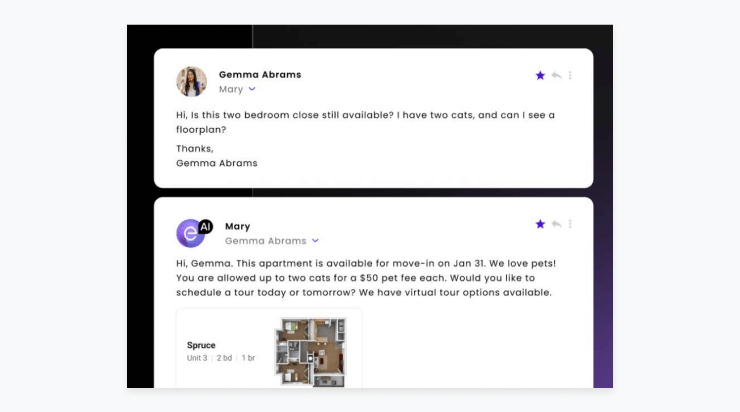
Construction project management
By leveraging machine learning algorithms and predictive analytics, AI tools can manage and optimize various aspects of construction, such as scheduling, resource allocation, risk management, and cost estimation. These tools analyze data from past projects, current site conditions, and market trends to provide actionable insights and make data-driven decisions. This results in more precise project timelines, improved resource utilization, and minimized risks and delays, ultimately leading to more successful and cost-effective construction outcomes.
Impact:
- Project managers: AI-powered software optimizes planning and resource allocation, ensuring projects stay on schedule and within budget, ultimately improving project outcomes.
- Construction companies: Enhanced efficiency and reduced costs through AI-driven risk management and predictive analytics lead to higher profit margins and successful project completions.
- Engineers and architects: AI provides valuable insights and data-driven recommendations, enabling more precise and informed decision-making throughout the design and construction phases.
Example AI tools:
- Doxel: Leverages computer vision and machine learning to analyze visual data from construction sites, monitor progress, identify potential issues, and assist project managers in decision-making.
- OpenSpace: Construction software and computer vision platform that uses artificial intelligence and 360° cameras to capture, map, and manage projects in real-time.
- Zepth: Serves as a design collaboration platform for construction professionals through AI-powered communication, document sharing, and project management.
Read More: 5 Best Construction Management Software Tools
Case study:
The Pennsylvania Chemicals Project - the largest construction site currently active in the United States - utilized Doxel’s AI software to significantly enhance construction project management. By implementing Doxel's computer vision and AI-driven analytics, the project team was able to monitor progress in real-time, identify potential issues, and make data-driven decisions.
This resulted in improved efficiency, reduced delays, and cost savings. Doxel's technology provided detailed insights into the installation of materials and adherence to project timelines, ensuring a more streamlined and successful project execution.
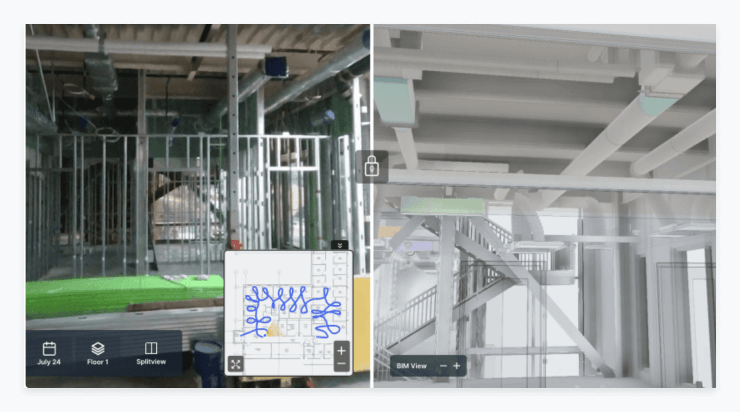
Conclusion
As AI continues to revolutionize the real estate industry, learning from these innovative use cases and integrating AI into your own team’s strategy can provide a significant competitive edge. Investing in AI technology today will not only keep you ahead in the adoption race but also pave the way for sustained growth and success in the future.
Looking for a partner to help you take advantage of the power of AI?
Our real estate software development team can build a custom AI solution tailored to the needs of your business. We’ll work with you to design a comprehensive strategy that ensures seamless integration, functionality, and scalability for the future growth of your brand.






![What is PropTech? 2025 Guide [+15 Fastest-Growing Startups]](/uploads/blog/what-is-proptech/what-is-proptech.png)
![Top 7 Smart Building Software Solutions [2025 Review]](/uploads/blog/smart-building-software/smart-building-software.png)